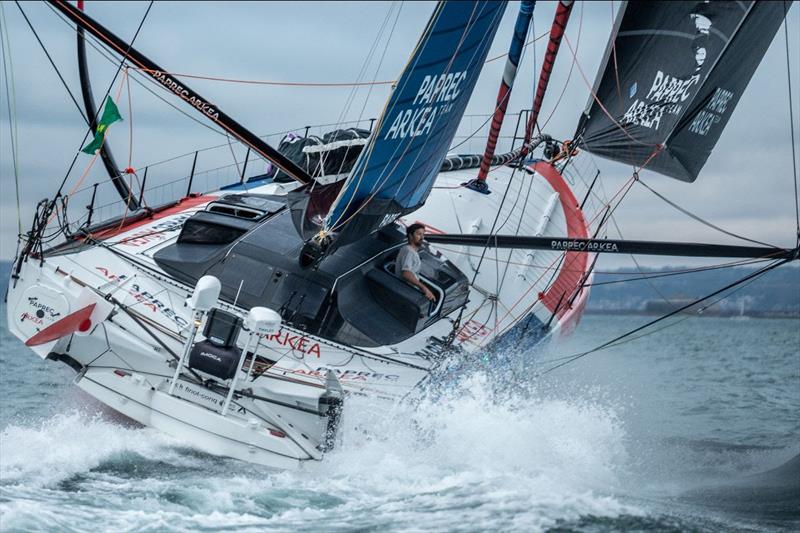
IMOCA Class votes against T-rudders & approves on-going work on reducing emissions in boat building
by Ed Gorman / IMOCA Globe Series 21 Oct 2023 17:02 BST

Paprec Arkéa © Théo Dolivet-David / polaRYSE / Paprec Arkéa
With just over a week to go to the start of the Transat Jacques Vabre Normandie Le Havre, the IMOCA Class has re-affirmed its ban on introducing T-foils on its boat’s rudders, and voted overwhelmingly in favour of introducing new restrictions on boat building to reduce carbon emissions.
The Annual General Meeting (AGM) of the Class took place in Le Havre on Friday, with most of the almost 40 teams taking part in the Transat Jacques Vabre present at a forum that also included votes on a revision of the one-design mast which aims to increase safety coefficients, possible new rules on engine size, limits to the number of sails carried during races and other technical measures and improvements.
But the biggest discussion point was on the issue of T-foils on rudders which would convert IMOCAs from skimming boats with foils to even faster fully flying ones. Those in favour of the change say it would be within the spirit of innovation that is a cornerstone of the IMOCA Class's philosophy, that the change can be made simply and that it would greatly improve the level of comfort for skippers as they fly above the waves.
Those against, meanwhile, point to the likelihood that T-foils would lead to big changes in the way boats are built, to cope with the extra stresses and speeds, and that masts would have to be re-designed amongst many other changes which would make this additional capability expensive to implement.
Antoine Mermod, the President of the IMOCA Class, said the collaborative spirit and level of debate was very impressive from the group. He said this latest decision will not be validated and confirmed until next April when the Class rules up to 2029 will be confirmed.
"Having this meeting, with most of our teams having input and sharing in the debate, is the right way to build something stronger because it is a long process to establish good rules and find the right balance that will then be accepted by most of the teams," he said.
Mermod said the issue of T-foils was a complex one with many elements to consider.
"When you choose the next step - the next innovation - it's quite easy to feel what it might be, but the problem is more about when you do it than what it is," he explained. "If the Class is enjoying a successful period in its evolution, then sometimes it is good to make it stronger incrementally and to make changes at the right time, more than being led by technical innovation."
The switch to fully-foiling may happen, Mermod argues, but the key issue is when that is.
"For sure, at one point the goal will to be go around the world by flying over the waves - which is fantastic - but to do it in the best conditions, is that now or a bit later? When you hear all the arguments that were put forward at the AGM, they are all good actually and all the speakers were right in what they said. But, if you see the group as a whole, people are considering if this the right time or not and that's why the vote on this is something strong," he said.
Mermod was delighted that the Class gave its full support to its on-going programme and research into reducing the environmental affects of boat building which, he said, had begun with a life-cycle analysis of the various components that go into a new IMOCA.
"Our goal is to push down the impact of building a new IMOCA and I am delighted that the skippers and teams are fully behind the work that we are doing in the Class on this," he said. "Now we are proposing a new rule, that is inspired by one used in the America's Cup, to reduce carbon emissions during new boat building. This rule has been created through consultation with our teams, suppliers, builders and the whole industry involved. This is the first step towards establishing a carbon cap for the IMOCA Class."
With the two-handed TJV just ahead and the solo Retour À La Base to follow, Mermod said this was an exciting time for the Class.
"Actually we are entering the 'money time' to prepare for the Vendée Globe," he said. "With the TJV, and especially the Retour, we will have the first long distance races of this season with all the skippers and their boats taking part, and this marks the beginning of the analysis of who is fast and what's the quality of each boat. Most of the boats that have been re-fitted or newly-launched are now ready and, I would say, it is really the start of the game."
Mermod said the perception that qualification for the Vendée Globe might inhibit skippers from racing full-on in these two transatlantic tests was hardly relevant given the scale of the challenge they face as autumn turns to the northern hemisphere winter.
"When you sail across the Bay of Biscay and Atlantic in November and then back single-handed in December, this is not just an exercise in qualifying for something else, it is a huge challenge," said Mermod. "We should think about the toughness of each challenge more than thinking about qualifying for another race," he added.
The IMOCA Class elected two new board members at the AGM: Damien Seguin, the skipper of Groupe Apicil and David Sineau, team manager of Initiatives Coeur.